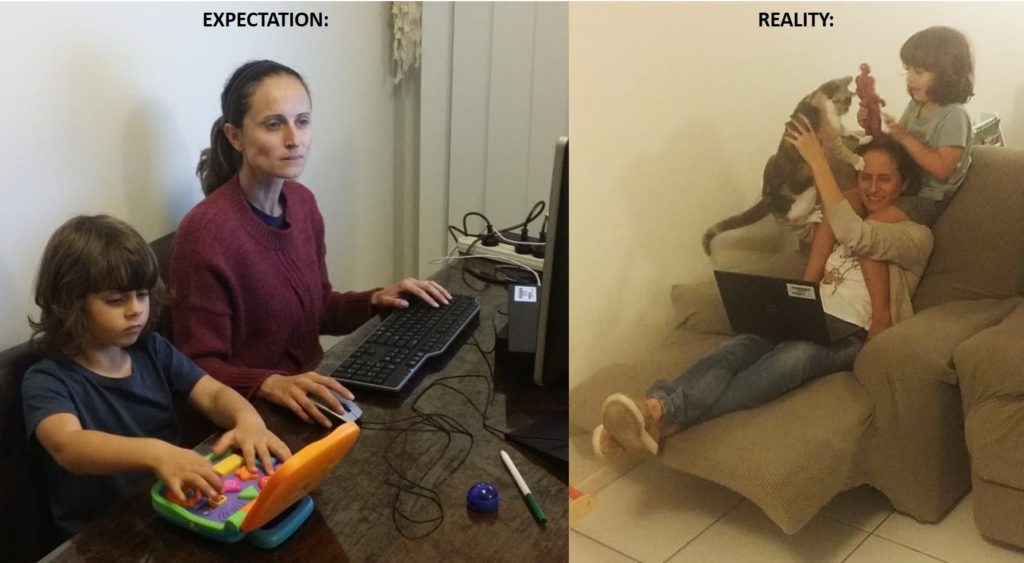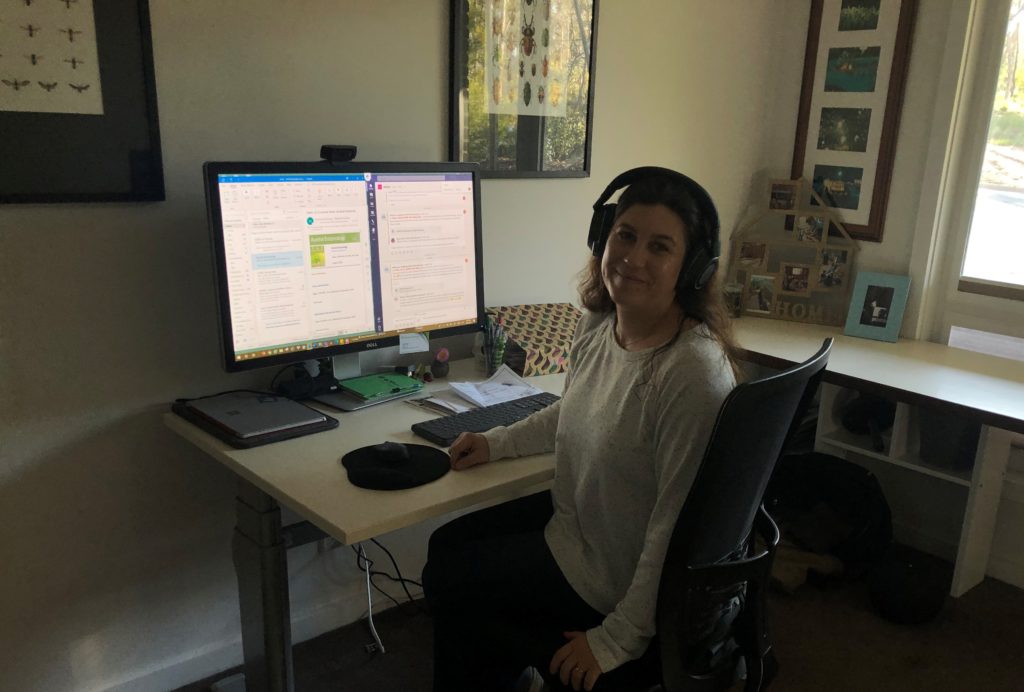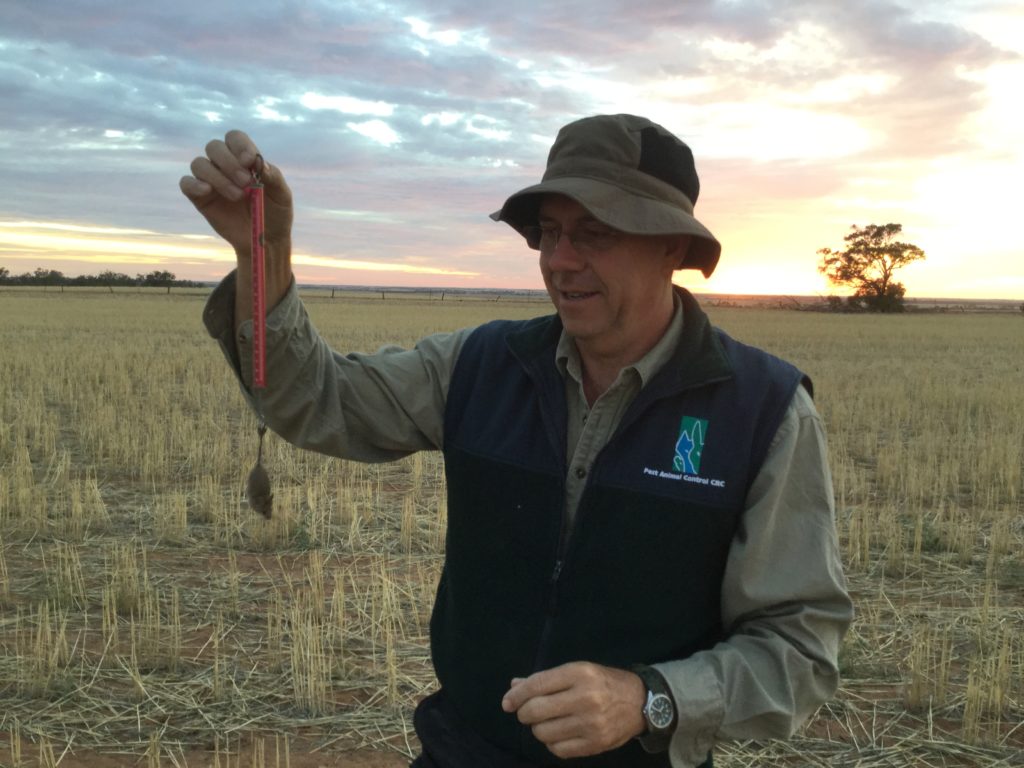Like everyone else, we’ve made some changes to our working arrangements this year. Many of us have been working from home for many months now. Three of our people share how they’ve adapted their work or science during lockdown. And even uncovered some hidden benefits.

Paula has no problem being honest about navigating her new working world.
Professional development at all time high
Paula Lima is a postdoctoral fellow within our Livestock and Aquaculture Program. Her main research interest is aquatic animal health, more specifically microbiology and host-pathogen interactions. Paula is from a different cultural and linguistic background, and has gained some wins from the new working situation.
“The idea of working from home full-time was really daunting at the beginning. Being a true South American, I really value the informal daily face-to-face interaction with my colleagues,” Paula said.
“The fear of dropping productivity and adjusting to the new routine was also a challenge in the beginning. It often resulted in stress and overwork. When you have an office routine it’s easier to leave what you do at the workplace.
“COVID-19 has brought more learning and development opportunities for people who are restricted due to caring responsibilities or disabilities. It took me nearly two years after having my son to be able to attend the first scientific event. I was also based in Bribie Island at that time, which made it even harder finding suitable professional learning opportunities to further develop my skills as a postdoctoral fellow.
“Working from home has allowed me to attend more webinars, discussion forums and training courses than before. These opportunities have always been available, but it has taken a global pandemic for people to start taking advantage of them,” she said.

Nicole has found some unexpected delights in her new working arrangement.
Always improving an inclusive environment
Nicole is a senior research technician. Her role as a digitisation expert is to manage the digitisation projects, resources and people for our National Research Collections of Australia.
Nicole also has a hearing disability, so moving to an exclusive online environment has had its perks.
“Initially it felt like chaos and I was very worried about how to make it all work. Nevertheless, with some time to adjust, I’m now far more productive than before,” Nicole said.
“With a hearing impairment, moving all meetings online has had some ups and downs. One added benefit of online meetings means only one person can talk at once. I no longer have to approach a meeting room full of people, who may be talking all at once, which can be a noisy environment to hear in.
“But there are still some areas we can improve on. With group meetings, it’s helpful if the person talking turns their camera on. Having video takes a lot of the guesswork out of working out who is speaking. An agenda or sharing information on the screen also provides context. So I can expect what to hear, or know where the conversation may lead, which helps prepare me.
“One downside of video meetings is someone with hearing loss reads body language up to 60 per cent to hear. This is harder over video and often you can’t pick up the clues you would have beforehand,” she said.

Steve out in the field for his essential work. Luckily he was able to complete his science during lockdown.
Essential work saved this father
While Steve Henry might have been labelled a ‘disruptive influence’ on his children, luckily his work was considered an essential service.
As a research officer in our Health and Biosecurity team, Steve works on a range of projects aimed at reducing the impact mice have on crop production systems in Australia.
“My role in the team involves all aspects of project management, data collection and interaction with farmers and industry reps and the media,” Steve said.
“At the beginning of the pandemic, the whole team reverted to working from home. We gave up any idea of completing our autumn field work program. As things have changed, we’ve been able to adapt and continue to work safely and effectively.
“We’ve been lucky enough that our work fulfilled the criteria for essential services in South Australia. With significant care, we’ve been able to complete our autumn field work program. This was lucky on a couple of fronts. If I hadn’t been involved in field work, I was about to be expelled from home for being a disruptive influence on the children,” he said.
Keen to hear how others have adapted their science during lockdown? We chat to two researchers who monitor sea creatures.


22nd October 2020 at 12:27 pm
Congratulations to the teams of CSIRO scientists, quietly pushing the boundaries of human knowledge, in this time of crisis!